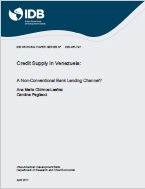Credit Supply in Venezuela: A Non-Conventional Bank Lending Channel?
Date
Apr 2017
This paper evaluates whether fiscal and foreign exchange policy shocks canexplain both credit and credit supply in Venezuela. Empirical evidence suggests that between 65 and 90 percent of credit growth is linked to the buildup of banks' deposits caused by the monetary effects of fiscal expansions. For these cases, since credit is provided at equal or reduced interest rates, credit supply takes place. Loan supply can occur either endogenously, when fiscal domestic spending increases with expansionary aggregate supply shocks, or exogenously, when fiscal policy shocks emerge. The role of exogenous fiscal shocks in accounting for credit supply is preponderant in the long run. This evidence suggests fiscal shocks represent a non-conventional bank lending channel. Because this exogenous fiscally-triggered credit supply does not significantly contribute to boosting real activity, its major cost might be associated with high credit volatility.



